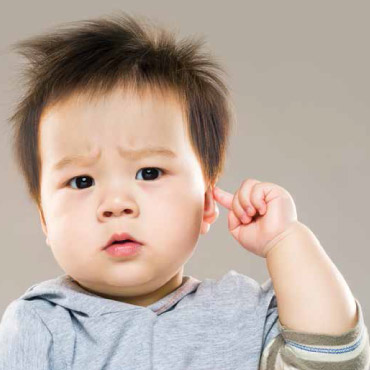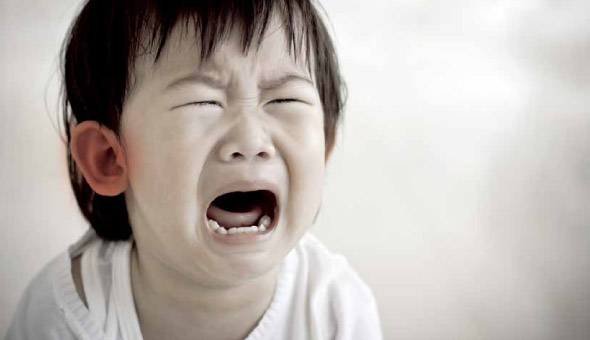Earache caused by infections commonly happens between the ages of six months and two years, but can continue happening until your child is an adult. The earache can range from mild discomfort to a very sharp, dull, or burning pain in or around your child’s ears. It happens to children more than it does to adults as children have shorter and narrower Eustachian tubes that are also softer and more difficult to remain open (the Eustachian tube physically links the throat with the middle ear), and a less effective immune system.
The pain or discomfort from earache may be present all the time, or it may happen intermittently. It can also happen in either ear, or it can affect both ears at once. There are many possible causes for earache; some may affect the ear itself, while others may be caused by other conditions that affect the areas close to the ears.
IMPORTANT!
If your child develops a stiff neck (he is unable to rest his chin on his chest), has pink or red swelling behind his ear(s), or a fever above 40°C that does not go down within two hours after taking fever medicine, then see your paediatrician immediately.
Common causes of earache
These include:
- Teething.
- Sore throat.
- Changes in air pressure (e.g. taking a flight or driving through a hilly/mountainous area).
- Fluid build-up in the middle ear (the area behind the eardrum). Also known as glue ear, can cause some hearing loss in the affected ear(s).
- Infection of the ear canal (the area outside the eardrum). This condition is known as otitis externa and may be caused by an inflammation or infection of the area at the outer ear/ear canal.
- A boil or an infected hair follicle in the ear canal.
- Skin conditions can cause the ear canal to become inflamed. This includes conditions such as eczema and seborrheic dermatitis.
- Physical injury to the ear canal. This may be caused by foreign objects placed in the ear canal –even using cotton buds can damage the sensitive lining of the ear canal.
- Blocked ear canal. This may be in the form of earwax or foreign objects that the infant/toddler puts into his ear that becomes stuck.
- Throat infections, tonsillitis, and colds – these can spread to the middle ear, possibly causing otitis media or middle ear infection.

Recognising the signs
- Appearing hot and irritable
- Poor feeding in babies, a loss of appetite in children
- Pulling, tugging or rubbing the affect ear(s)
- Problems sleeping (e.g. restlessness at night)
- Running a high fever (over 38°C)
- Coughing and runny nose
- Unable to hear sounds as well as he normally does.
- Problems with his balance (e.g. stumbling when he walks, swaying when sitting/standing upright, etc.)
Some of the more common signs that indicate your baby may be suffering from an earache include:
Did you know?
Ear infections can occur as a single, isolated infection, but can also recur after the condition has cleared up. If this is the case, then you will need to exercise more caution in caring for your child to ensure that the ear infection does not happen regularly.
Earache can be treated
It is important that you stay vigilant to spot the signs of earache early. It is a treatable condition, and if nipped in the bud, will not lead to long-term complications. The most common cause of ear infections is a cold or the flu. These may cause your child’s Eustachian tube to become swollen, thus blocking the flow of air to his middle ear. If your child has allergies, it may also cause a similar effect.
Bacterial infections are also a common cause for earache, and some of the most common bacteria found in infected middle ears are the same ones that cause sinusitis, pneumonia, meningitis, and other respiratory infections. It is possible to vaccinate your child against these by giving him the pneumococcal conjugate vaccine, which can be given to infants and toddlers to prevent deadly complications such as meningitis, pneumonia, and bacteraemia.
An educational contribution by Malaysian Paediatric Association.







Comments